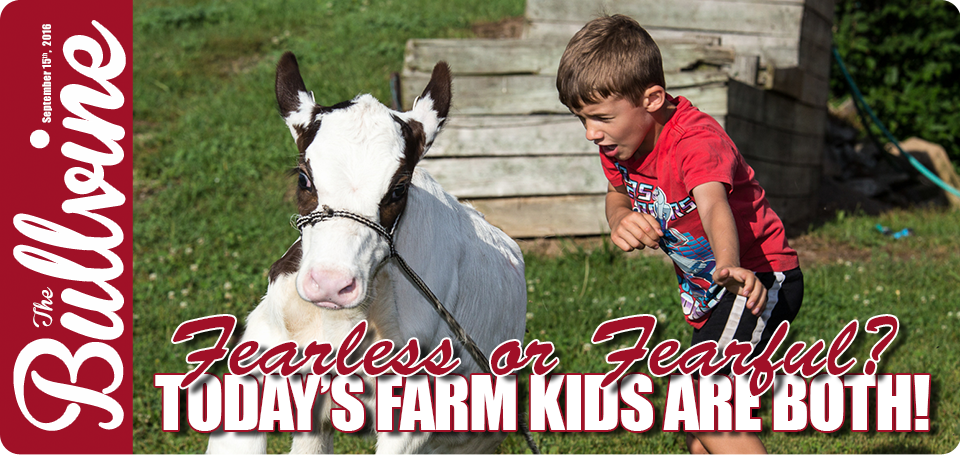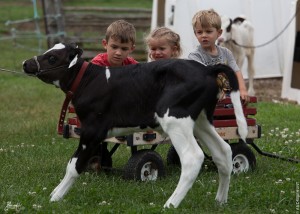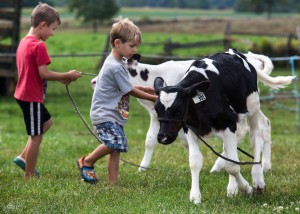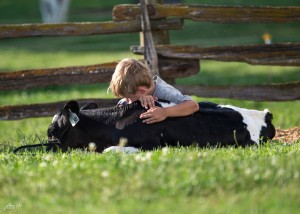The kids are back in school. Harvest season is swinging into gear. Fall fairs are highlighting the 4-H and farm projects of future farmers. It seems that all’s well with the world until unfortunate headlines suggest that there is danger lurking behind the heartwarming scenes of farm kids, calves and trophies.
 FARM KIDS ON THE HIGHWAY. ARE THEY SAFE or SORRY?
FARM KIDS ON THE HIGHWAY. ARE THEY SAFE or SORRY?
A recent discussion on The Milk House raised questions around 10 to 12-year-olds driving tractors, trucks and large pieces of equipment on the highway.
Here at Huntsdale, I look over the top of my computer screen, whenever something passes on the concession road. It is still rare enough to be interesting! Lately, I have become more aware of how young the tractor and equipment drivers seem to be these days and how fast they are moving down the road. When my children were pre-teen, it seemed “okay” for them to drive a truck or tractor between the lanes and field entrances on the farm. As a grandmother of eight city kids, I am much more concerned about everyone’s awareness. Not just my own.
City kids have expectations of safety whenever they walk down a sidewalk. Country kids (and adults) are not always aware of walkers, joggers, and bicyclists who don’t seem to respect the size, speed and blind spots of modern farm tractors and equipment.
Then comes the question of experience.
Some of the modern equipment and the size of the loads can be a handling challenge even for an experienced (aka adult) farmer. Reaction time is something that takes repetition and judgment to master. From the opposite perspective, these days we have to take into consideration the fact that there are non-farm drivers who are not paying attention or who are more and more often distracted by texting and cell phones.
Safety of our children and the public is the first priority.
Many kids start to learn to drive on the farm property itself. However, knowing how to drive and being able to move around in traffic are two different skill sets. Keeping everything in the family, while overlooking the insurance risks, could be a sad way to lose everything, including the family. Everyone should take safety training. All decisions should be within the law.
Do you know the legal limit for drivers in your area? Is playing the odds making you reckless? Responsibility should be taken by everyone – grandparent, parents, children, staff and suppliers. As one contributor wrote on The Milkhouse “It only takes one accident to change everything for life” Another gave his heartfelt support. “To me, it is not worth putting my children’s lives in jeopardy. They are too precious.”
 IS MONEY AT THE ROOT OF ALL FARM KID EVIL?
IS MONEY AT THE ROOT OF ALL FARM KID EVIL?
It is sometimes enlightening to look at things we take for granted from the perspective of those not involved in agriculture or dairying. Almost everyone waxes nostalgic about their romanticized visions of life on the farm, but they come down hard on the idea of children being pawns in the search for profit. Of course, if you’ve ever heard a farm kid lamenting pre-dawn chores or harvest season backaches, you might not be blamed for assuming that farm offspring are being taken advantage of. Milk House comments acknowledge that there is a fine line between working with children and overworking them. “Honestly, if you cannot afford to hire older experience help, perhaps it’s time to reassess the sustainability of your operation.” One stated emphatically, “We should be allowing children to be children and not making them free slaves.”
It is best when everyone shares a mutual goal and a vision for a successful sustainable farm. As with any logistical situation, however, there are several ways to get to the same end result. Good communication will make sure that everyone experiences the passion and success of working on the dairy farm, without sacrificing their personal development. Children raised on farms often look back and acknowledge how their farm work experiences benefited them in their job searching and securing of employment.
When the experience is positive, it is usually possible to point to the way in which inter-generational teamwork, discussion, and open communication solved problems before they could become urban legends or scare-inducing newspaper headlines.
DOES FARMING TEACH KIDS THE CIRCLE OF LIFE OR THE CIRCLE OF DEATH?
It is only natural for parents to want to protect their children from the unpleasant aspects of life. Sad experiences are part of the package that comes with raising food producing animals. It seems unfair that the closeness that develops in selecting, training, showing and raising a farm animal can also include illness, sale or (death). The upside is that farm kids can learn and participate in gaining a realistic view of the process and purpose of raising animals for food production. They can experience justifiable pride in taking responsibility for doing a good job with their animals. Nevertheless, at some time or other all dairy kids experience seeing their beloved first calf sold or auctioned off to a different farm or sent to market for beef. It was a heart-wrenching experience for all of us when the Huntsdale dairy herd sold. Even at age 10 Andrew was there videoing the memories, while tears streamed down his face. Sometimes unexpected illness has a devastating outcome. Once a calf had a heart attack and died while being led around the barn yard. The times when there isn’t a logical explanation are the ones that are hardest ones to help young family members to deal with. Avoiding the experience isn’t the answer. It is good to talk frequently about the full range of outcomes that may happen. At the end of the day, everyone looks forward to participating in the next new beginning. Celebrating successes is part of making the goodbyes easier to handle. Unfortunately, not everyone sees life and death on a dairy farm as natural or even acceptable.
 Farm Youth Are Being TARGETED by Animal Rights ACTIVISTS
Farm Youth Are Being TARGETED by Animal Rights ACTIVISTS
When animal rights activists attack the dairy industry or its associations or even particular farm practices, we are becoming practiced at projecting a Teflon image and letting the extremist viewpoints run off while, hopefully, taking constructive steps to address any potential problems. Having said that, we don’t have such a balanced viewpoint when we are presented with the rising reports of animal rights activist groups disrupting agricultural youth events and activities. Their claim is that “animals are being denigrated, enslaved and killed.” While espousing that they are concerned about the care and respect shown to animals, they have no problem throwing blood on contestants. It is happening often enough, that proactive groups are preparing media statements, appointing spokespersons and establishing and posting animal welfare policies
It would be easy to end our discussion with the feeling that life on the farm is more down than up. That simply isn’t true. And there really is truth in the idea that we can learn and benefit from the hard times that we find our way through. As mentioned previously, actual experience in dealing with problems …. good work ethics and intergenerational teamwork and communication means that farm children who grow up actively involved in the dairy operation, also grow up better prepared to enter the workforce – whether it’s on or off the farm. There are many groups such as the Animal Agriculture Alliance (www.animalagalliance.org) that are prepared to provide resources and advice. A key message that they endorse is “If you do end up confronted by protestors, remember that their goal is to provoke you into conflict and create a scene. They thrive on publicity of any kind – avoid giving it to them by not engaging.”
The BULLVINE BOTTOM LINE
When it comes to the emotional side of farming, there will always be a full range of experiences. Teamwork and good communication can often sway the potentially negative results toward the positive. It is always better to be prepared by acknowledging that there is a fearful side to dairy farming. Sometimes it can be controlled by good training, setting safety protocols and establishing animal welfare practices. Other times, we face a challenge that is outside of our own control, and we must respond to unexpected and unpleasant attacks. At all times, we need to proactively support each other and, especially, our youth as we work together to maintain safe learning experiences both on and off the farm.






 FARM KIDS ON THE HIGHWAY. ARE THEY SAFE or SORRY?
FARM KIDS ON THE HIGHWAY. ARE THEY SAFE or SORRY? IS MONEY AT THE ROOT OF ALL FARM KID EVIL?
IS MONEY AT THE ROOT OF ALL FARM KID EVIL? Farm Youth Are Being TARGETED by Animal Rights ACTIVISTS
Farm Youth Are Being TARGETED by Animal Rights ACTIVISTS









Leave a Reply
You must be logged in to post a comment.